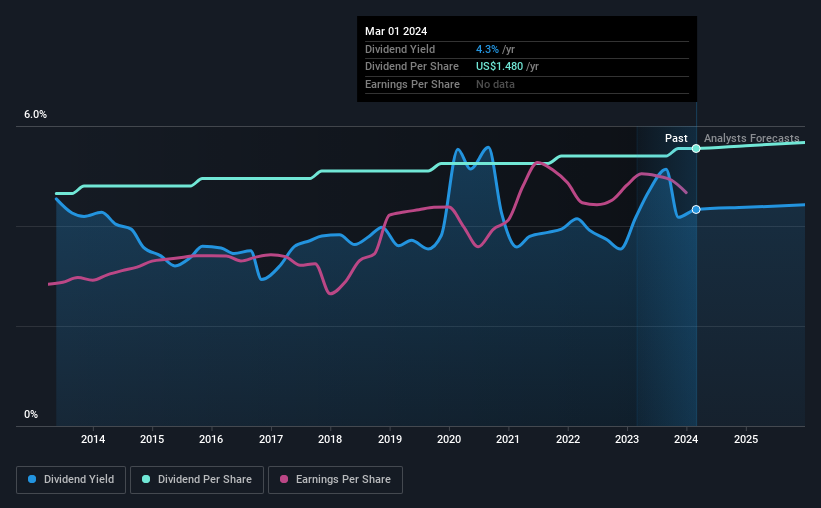United Bankshares, Inc. (NASDAQ:UBSI) Stock Goes Ex-Dividend In Just Four Days
United Bankshares, Inc. (NASDAQ:UBSI) is about to trade ex-dividend in the next four days. The ex-dividend date occurs one day before the record date which is the day on which shareholders need to be on the company's books in order to receive a dividend. The ex-dividend date is important as the process of settlement involves two full business days. So if you miss that date, you would not show up on the company's books on the record date. This means that investors who purchase United Bankshares' shares on or after the 7th of March will not receive the dividend, which will be paid on the 1st of April.
The company's next dividend payment will be US$0.37 per share, on the back of last year when the company paid a total of US$1.48 to shareholders. Based on the last year's worth of payments, United Bankshares has a trailing yield of 4.3% on the current stock price of US$34.18. Dividends are an important source of income to many shareholders, but the health of the business is crucial to maintaining those dividends. So we need to check whether the dividend payments are covered, and if earnings are growing.
See our latest analysis for United Bankshares
Dividends are usually paid out of company profits, so if a company pays out more than it earned then its dividend is usually at greater risk of being cut. United Bankshares paid out more than half (53%) of its earnings last year, which is a regular payout ratio for most companies.
When a company paid out less in dividends than it earned in profit, this generally suggests its dividend is affordable. The lower the % of its profit that it pays out, the greater the margin of safety for the dividend if the business enters a downturn.
Click here to see the company's payout ratio, plus analyst estimates of its future dividends.
Have Earnings And Dividends Been Growing?
Businesses with strong growth prospects usually make the best dividend payers, because it's easier to grow dividends when earnings per share are improving. If business enters a downturn and the dividend is cut, the company could see its value fall precipitously. With that in mind, we're encouraged by the steady growth at United Bankshares, with earnings per share up 2.0% on average over the last five years.
Another key way to measure a company's dividend prospects is by measuring its historical rate of dividend growth. United Bankshares has delivered 1.8% dividend growth per year on average over the past 10 years.
Final Takeaway
Has United Bankshares got what it takes to maintain its dividend payments? United Bankshares has been generating some growth in earnings per share while paying out more than half of its earnings to shareholders in the form of dividends. It might be worth researching if the company is reinvesting in growth projects that could grow earnings and dividends in the future, but for now we're on the fence about its dividend prospects.
Curious what other investors think of United Bankshares? See what analysts are forecasting, with this visualisation of its historical and future estimated earnings and cash flow.
A common investing mistake is buying the first interesting stock you see. Here you can find a full list of high-yield dividend stocks.
Have feedback on this article? Concerned about the content? Get in touch with us directly. Alternatively, email editorial-team (at) simplywallst.com.
This article by Simply Wall St is general in nature. We provide commentary based on historical data and analyst forecasts only using an unbiased methodology and our articles are not intended to be financial advice. It does not constitute a recommendation to buy or sell any stock, and does not take account of your objectives, or your financial situation. We aim to bring you long-term focused analysis driven by fundamental data. Note that our analysis may not factor in the latest price-sensitive company announcements or qualitative material. Simply Wall St has no position in any stocks mentioned.

